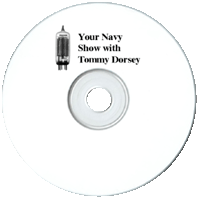

The most important part of the modern Navy is its Sailors.

12 old time radio show recordings
(total playtime 2 hours, 58 min)
available in the following formats:
1 MP3 CD
or
3 Audio CDs
Text on OTRCAT.com ©2001-2025 OTRCAT INC All Rights Reserved. Reproduction is prohibited.

The attack on Pearl Harbor presented a setback for the Pacific Fleet, but not as much of one as the Empire of Japan might have hoped. The American Navy dominated the Pacific, handily decimating Japanese shipping and air power. On the other side of the planet, the U.S. Navy's entry into the War kept the lifeline across the Atlantic open to Europe, allowing the Allies to bring the War to the Fascists.
The Cold War brought new threats, ad the U.S. Navy proudly stepped up to the plate to defend freedom. By the early 1950s, the aircraft carriers which proved so vital during the War were adapting to the jet age. Atomic weapons were on everyone's minds, but the Navy would make its own way into the Nuclear Age in the middle of the decade with the first atomic-powered submarine with nuclear-powered carriers in the early 1960s. The electronics boom would make the conventional weapons of the surface fleet even more deadly.
Despite, or perhaps because of the growing complexity of the technology that went into ships and Naval Warfare, the Fleet's most valuable asset was and remains its Sailors. The 'Old Salts" who fought the War would not be around forever, ad no expense would be spared to attract the best of America's young people to man the modern Fleet. Syndicated programs like Your Navy Show.

The real star of the show is "Captain" Tommy Dorsey and his Orchestra. "The Sentimental Gentleman of Swing" had been in bands since the early 1920s when his big brother Jimmy recommended him to the leader of the Scranton Sirens when the territorial outfit needed a new trombonist. Although Tommy's band was sometimes criticized for lacking any "jazz feeling", Sinatra joined the outfit in the early 1940s and cut more than eighty discs.
Swing may have been the music that won the War, but it would begin to fall from popularity soon after Your Navy Show was syndicated. However, the film The Fabulous Dorseys (1947, United Artists) helped to keep the band relevant. The Dorsey Brothers Orchestra would go on to embrace Rock and Roll (whether rock and roll would embrace the Dorsey Bros is debatable), while Navy Recruiting would focus its radio efforts around Country and Western music for the next several years.
These recordings are also part of the US Navy Shows compilation.
Text on OTRCAT.com ©2001-2025 OTRCAT INC All Rights Reserved. Reproduction is prohibited.
You have reached the maximum number of votes for a unregistered user.
Please login or create a new account to continue...
You have reached the maximum number to down votes in this page.



Your Navy Show Disc A001
|
Add Audio CD to Cart - $5.00 |
Your Navy Show Disc A002
|
Add Audio CD to Cart - $5.00 |
Your Navy Show Disc A003
|
Add Audio CD to Cart - $5.00 |
Please wait...
COMMENTS
Be the first to comment on "Your Navy Show"
Leave a comment